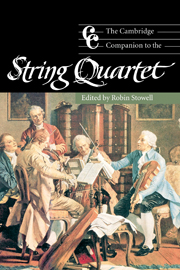Book contents
- Frontmatter
- Part I Social changes and organological developments
- Part II Celebrated ensembles
- Part III Playing string quartets
- Part IV The string quartet repertory
- 8 The origins of the quartet
- 9 Haydn, Mozart and their contemporaries
- 10 Beethoven and the Viennese legacy
- 11 The Austro-Germanic quartet tradition in the nineteenth century
- 12 Traditional and progressive nineteenth-century trends: France, Italy, Great Britain and America
- 13 Nineteenth-century national traditions and the string quartet
- 14 The string quartet in the twentieth century
- 15 The string quartet as a foundation for larger ensembles
- Notes
- Select bibliography
- Index
10 - Beethoven and the Viennese legacy
from Part IV - The string quartet repertory
Published online by Cambridge University Press: 28 September 2011
- Frontmatter
- Part I Social changes and organological developments
- Part II Celebrated ensembles
- Part III Playing string quartets
- Part IV The string quartet repertory
- 8 The origins of the quartet
- 9 Haydn, Mozart and their contemporaries
- 10 Beethoven and the Viennese legacy
- 11 The Austro-Germanic quartet tradition in the nineteenth century
- 12 Traditional and progressive nineteenth-century trends: France, Italy, Great Britain and America
- 13 Nineteenth-century national traditions and the string quartet
- 14 The string quartet in the twentieth century
- 15 The string quartet as a foundation for larger ensembles
- Notes
- Select bibliography
- Index
Summary
The composition and publication of Beethoven's first six quartets, Op. 18, are intertwined with those of Haydn's Op. 76 and Op. 77. Haydn had completed the six quartets of Op. 76 in 1797 but they were not published until the July and December of 1799, dedicated to Prince Joseph Erdödy who had commissioned them. Meanwhile Haydn had embarked on a new set commissioned by Prince Lobkowitz, completing two works in 1799; progress on a third work was painfully slow and eventually the two completed quartets only were issued, as Op. 77 in September 1802. The dedicatee, Prince Franz Joseph Maximilian Lobkowitz, was one of Vienna's leading patrons of music, devoting large amounts of money to the commissioning, purchasing and performing of all kinds of music, from songs to oratorios, and sonatas to symphonies. Over the next decade he was to become one of Beethoven's most ardent supporters, a process that began in 1798 in a deliberately significant manner with the commissioning of six quartets. Beethoven began work on them in the summer of 1798, and handed over copies of the first three in autumn 1799 and the final three in autumn 1800. They were not published, however, until 1801. In the case of both Haydn and Beethoven these contemporaneous quartets – Op. 76, Op. 77 and Op. 18 – initially remained in the private possession of the two aristocrats who had commissioned them, Erdödy and Lobkowitz, until their publication when they were released to the public with formal dedications. While it is possible that Beethoven may have seen manuscript copies of Haydn's Op. 76 and Op. 77 (particularly the latter because they were commissioned by Lobkowitz) before completing his set, it is likely that only with the publication of Op. 76 in the period July–December 1799 was Beethoven able to study any of Haydn's latest quartets. Having already completed three of the quartets of Op. 18 (nos. 1, 2 and 3), Beethoven revised them in the summer of 1800, and it is tempting to speculate that the revision was in part prompted by the publication of Op. 76.
- Type
- Chapter
- Information
- The Cambridge Companion to the String Quartet , pp. 210 - 227Publisher: Cambridge University PressPrint publication year: 2003
- 3
- Cited by

